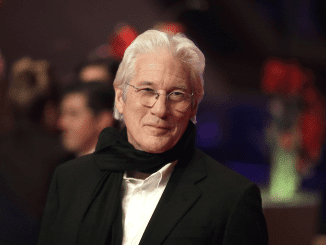On the morning of September 11, 2001, 20-year-old Aaron McLamb had just reached his office on the 10th floor of a building near the Brooklyn Bridge when disaster struck. A plane had slammed into the North Tower of the World Trade Center. As he watched in shock, a second aircraft crashed into the South Tower minutes later. Grabbing his camera, McLamb rushed to a bay window and began capturing the chaos unfolding before him.

One of the most unforgettable images he took that day shows a red FDNY fire truck—Ladder 118—racing across the Brooklyn Bridge, with plumes of black smoke billowing from the burning towers behind it. At the time, no one knew this photograph would become a symbol of bravery—and that the six firefighters on board were on their final call.
Ladder 118 was responding to an emergency in Lower Manhattan, unaware that the mission would end in tragedy. McLamb, an amateur photographer from North Carolina who had long admired firefighters and often passed by the Ladder 118 firehouse in Brooklyn Heights, never imagined his photo would capture such a poignant moment in history. “Not all heroes wear capes,” he later said.
McLamb had dreamed of being a firefighter himself and frequently chatted with the crew at the station. He often photographed Ladder 118 and shared his work on Instagram under the handle @rr_equipment_and_more. But the image he took on 9/11 would immortalize the heroism of the men aboard the truck.
From his high vantage point at the Jehovah’s Witness facility, McLamb saw the flames engulfing the North Tower. Moments later, around 9 a.m., a second jet veered into view and sliced into the South Tower. Acting on instinct, McLamb retrieved his camera from storage and began snapping photos.
That haunting image of Ladder 118 speeding toward the disaster would soon be seen around the world.
The Heroes of Ladder 118
Following the second plane crash, firefighters Vernon Cherry, Leon Smith, Joey Agnello, Robert Regan, Pete Vega, and Scott Davidson left their station and headed into the smoke-filled streets of Lower Manhattan. They reached the Marriott World Trade Center Hotel, nestled between the Twin Towers, and rushed inside to help evacuate guests.
Survivors later described seeing the men from Ladder 118—identifiable by the number on their helmets—bravely running up the stairs. They were never seen alive again.
Bobby Graff, a former elevator mechanic at the Marriott, witnessed their final acts of courage. “They knew exactly what was happening,” he said. “And they went down with their ship. They weren’t going to leave until everyone was out. They must’ve saved hundreds of lives. I know they saved mine.”
Graff later shared with the firehouse how the team refused to abandon the building. Retired firefighter John Sorrentino added, “[Graff] heard the rumble of the tower collapsing and everyone ran. He was lucky to survive. He saw the looks on the faces of the Ladder 118 guys—they knew how bad it would end, but they stayed to save others.”
Some of the men’s remains were found close together, while others were recovered in the following days and weeks. The truck, last seen charging across the Brooklyn Bridge, was found mangled in the rubble. Two months later, rescue workers unearthed tools engraved with “Ladder 118.”
Honoring the Fallen
Each of the six firefighters had a story—and a life full of love, service, and family.
- Vernon Cherry, a 30-year FDNY veteran, was preparing to retire at year’s end. A father of three and talented wedding singer, he was known for his voice, always singing—whether walking up the stairs or in the locker room.
- Leon Smith, 48, was the driver of Ladder 118. A father of three, he treated his fire truck like a prized possession. “He called it his girlfriend,” said his mother Irene.
- Joseph Agnello, 35, was a devoted father of two who loved his family, his dogs, and a quiet life. “He didn’t need attention,” said his wife Vinnie Carla. “Most neighbors didn’t even know he was a firefighter.”
- Lt. Robert “Bobby” Regan, 48, had been a civil engineer but joined the FDNY to spend more time with his kids. “He was Mr. Mom,” said his wife, Donna. “We knew how lucky we were to have each other.”
- Pete Vega, 36, was a U.S. Air Force veteran who served in Desert Storm before becoming a firefighter in 1995. Just before the attack, he called his wife—mother to his children. “He’d clean our gutters and the neighbor’s too,” she remembered.
- Scott Davidson, 33, began his FDNY career in 1994. Known for his humor and love for Christmas, he left behind a son, comedian Pete Davidson. “When Dad says he’s coming to pick you up and doesn’t,” Pete once said, “you stop believing people.”
Agnello, Cherry, and Vega were laid to rest side by side in Brooklyn’s Green-Wood Cemetery. “They were found together, and they should stay together,” said Agnello’s wife.


